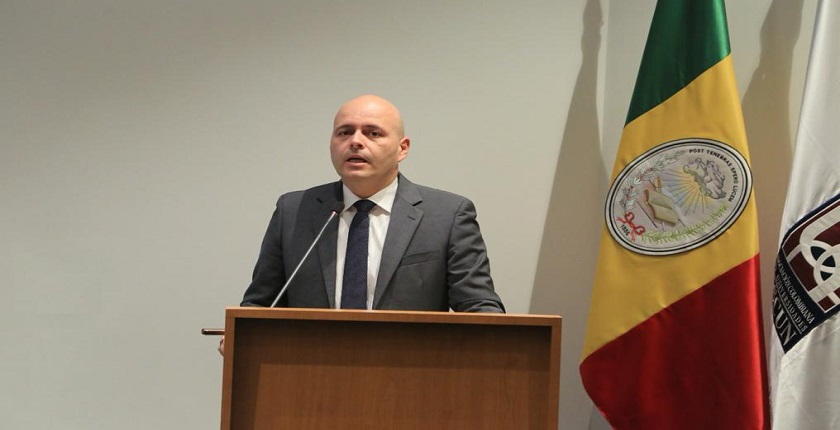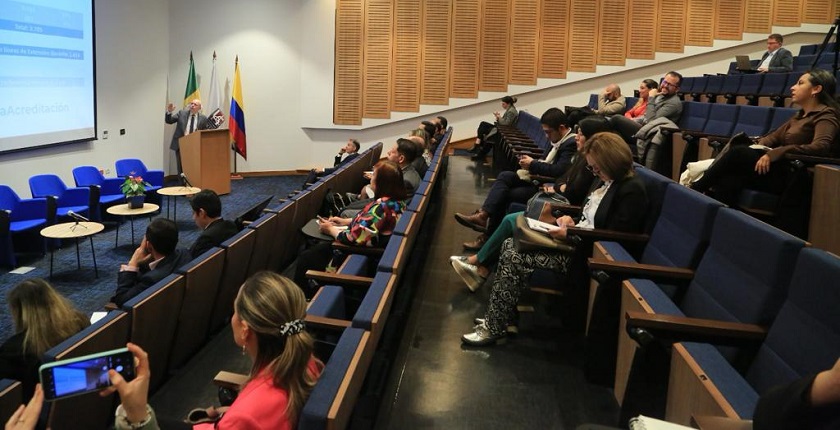Blog
Universities analyze the future of Extension in the current situation of the country
- 31 octubre, 2023

The Externado University of Colombia was the venue for the IX Annual Meeting of the Extension Network of the Colombian Association of Universities – ASCUN. The event that brought together the directors of higher education institutions in the central node of the country, had the purpose of generating a space for synergy and academic reflection on the new challenges and possibilities of Extension, in light of the political and economic transformations. of the country and the region. This academic work and reflection by university leaders included the participation of the Vice-Rector for Extension and Social Projection of María Cano, Carlos Julio Escobar Noreña, as the central speaker of the Meeting with the presentation “New trends, perspectives and challenges of Universities in Colombia and Extension in the current national context.

University extension is of vital importance for the actions of higher education institutions, the Universia.net portal highlights that: «University extension is the set of actions carried out by an educational institute, which propose the interaction of its students, group teacher, and other people linked to it, with the social environment. We can define that function currently, and we could add that the main purpose is to interact with the social and cultural environment to contribute to its improvement and transformation, but not always It was like that. The university extension arose from the fact that, together with the changes produced by the Industrial Revolution, an attempt was made to make the possibility of education available to everyone, when until then it was only for those with better economic conditions. At that time, it was They opened inclusion and instruction courses for everyone who made up the community, without differentiation of economic classes.
The articulating function between the university and its environment is proposed by the university extension through different activities that can be:
Courses and workshops: They can be open to the community by joining the institution, or they can be for its members.
Job training: They are part of the courses but directly oriented towards training in a specific job.
Conferences, shared work spaces, debates: It involves taking a specific topic and inviting those who work or research on it to present it or propose it for debate.
Technical assistance: With the knowledge acquired during the university career, provide assistance or help to other members of the educational community, as well as to third parties, who may be individuals or other institutions or associations.
Choirs and musical activities: Invite participation in cultural activities proposed, organized and carried out by the institution itself, such as a choir or any other.
Social responsibility: The university or educational institution, as an active participant in the society in which it is inserted, can help solve social problems. Students are invited to carry out extracurricular activities that have, for example, solidarity purposes with unprotected sectors or those in situations of inferiority.
Sports: The university extension invites students to participate in sports activities. They can be organized by the universities themselves as well as providing discounts through commercial links with sports-related companies.
Internships: It is one of the main functions. Providing students with possibilities to carry out internships, which can be national or abroad. From the university extension, agreements can be made with companies for direct contact and the student can also be approached with the necessary information so that they can obtain an internship on their own.
Art and culture: Just as we mentioned about sports activities, the proposal also includes artistic and cultural activities. From self-management to those that are external and some benefit can be obtained for students.
Volunteering: It is closely linked to social responsibility. The volunteers are organized externally and what the university extension does is the coordination between those responsible for them and the students, so that access to information is easier and more effective.
There are many other types of activities carried out by university extension, but here we leave you with the ones that we consider to be the most frequent, bringing you closer to the idea of why this function is important within an educational institution of that level. The display of commitment in situations of social risk is also a way of educating and that is why it is highly valued that universities take part in them. At the same time, in sports, culture and art, inclusive proposals are necessary to reduce the distance between social sectors. That is why we can summarize that university extension develops participation in the social environment with inclusive purposes, of the members with the outside, and of the outside with the institution and also with the social environment.»
In this way, participating with its academic and administrative leaders in different academic activities, analysis and debates about the present and future of higher education, the María Cano Foundation is part of the contexts of academic discussion in the country.
#MásMáríaCano
